
I've been a fan of Erik Larson's riveting brand of narrative history for years, and his latest book,
Dead Wake: The Last Crossing of the Lusitania, is his finest work yet. Suspenseful and expertly researched,
Dead Wake transports the reader to the Atlantic theatre of WWI, where the luxury passenger liner
Lusitania and a German U-Boat helmed by a ruthless commander race across the ocean for the safe harbors of England.
Dead Wake explores the tragic sinking of the
Lusitania, as well as the private and public lives of its passengers, its crewmen, its hidden submarine assailants, and the military and governmental figures involved in transatlantic travel and warfare at the turn of the century. In a starred review,
Kirkus calls it "an intriguing, entirely engrossing investigation into a legendary disaster," while Shelf Awareness reviewer Julia Jenkins notes, "
Dead Wake is both a thoroughly satisfying read, and an unparalleled adventure into world history. Larson's fans will rejoice, and grow in number."
÷ ÷ ÷
Rhianna: In the afterword of Dead Wake, you write that you "live for these moments" when "history becomes tactile." I love this expression because it suggests that, for you, writing is a form of time travel. I was wondering if that's accurate — if you experience writing in that way.
Larson: That's a pretty good way to look at it. I don't want to get too weird and hocus pocus about it, but that's accurate.
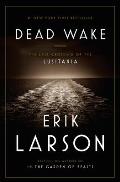 The thing that always pops into my head is the fresco on the ceiling of the Sistine Chapel, where God is reaching out and they're trying to touch each other. It's like the past and present briefly merge, typically through objects.
The thing that always pops into my head is the fresco on the ceiling of the Sistine Chapel, where God is reaching out and they're trying to touch each other. It's like the past and present briefly merge, typically through objects.
It does happen with every book, and it's always a very powerful moment. Like in the case of my previous book, In the Garden of Beasts, it was when I opened the first file of Martha Dodd's papers at the Library of Congress. At first glance, there were four of these files full of hundreds and hundreds of calling cards. I didn't pay much attention at first.
Then I started going through the cards. Suddenly, here was a calling card from Hermann Göring. There was a card from Joseph Goebbels. Here was one from Heinrich Himmler. It suddenly became a very powerful moment, because the last people who probably touched these things were the principals and monsters themselves. Here I am holding this card, held by one of the great monsters of the world.
To say I live for these things is maybe an exaggeration, but strange as this may sound, I need confirmation — real, tactile, concrete confirmation — that these things happened. It's one thing to think about the Lusitania and the sinking and so forth. It's another to be looking at morbid photographs of the dead from the Lusitania. That's when it all comes home.
Rhianna: It sounds like you have pivotal, almost accidental encounters with research objects. Is that how you choose which historical moments to write about, or do you make the choice beforehand and then the research leads you into these encounters?
Larson: No. I wish I could explain my idea process. It's very strange for me, and it's not at all something that I can ever convey well. It mostly relies on serendipity and chance. It's a structured serendipity, an educated serendipity, if you will, but almost invariably a thing that either strikes from the blue or seeps into my brain and starts rattling around enough that I start paying attention.
Which was the case with the Lusitania. I had always been interested in the Lusitania because I'm interested in ships and the whole maritime culture of America at the turn of the 20th century and before. I read a book called Transatlantic, which is a history of the great shipping lines. Also, of course, I had read about the Titanic and saw Leo drowning at the end of the Titanic movie, and all that stuff.
As I was thinking about potential ideas after In the Garden of Beasts, I suddenly realized, here's the 100th anniversary of the sinking of the Lusitania coming up. Ordinarily, I try to avoid anniversaries like the plague. In terms of books, they tend to be somewhat meaningless. All they'll do is guarantee that by the time you get into the market, you'll have competition.
Rhianna: Oh, I know. I'm a history book buyer. [Laughter]
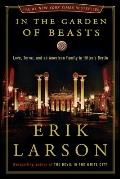 Larson: Obviously, the Lusitania has been written about before. I needed some little thing to tip the balance. The anniversary did that for me. If I needed a reason, there it was.
Larson: Obviously, the Lusitania has been written about before. I needed some little thing to tip the balance. The anniversary did that for me. If I needed a reason, there it was.
The Lusitania is not the kind of thing that I would ordinarily write about because I like things that are more obscure. Frankly, I like them that way because the barriers to entry are higher. It helps to ensure that nobody else is going to do the same book.
In the case of the Lusitania, I found it so compelling after I read the first book about the subject that I thought, Hey, I'm in this because I really like to write about things that are fun and interesting to explore. This one had the prospect of being fantastic on that level.
One thing I should add about ideas is that I always end up starting with a blank slate. I'm not like David Halberstam, RIP, who had a list of 10 books that he knew he was going to do. Whenever I have five ideas on my plate, I choose one and it gets done. Somehow the other ideas wither and die, because rejected once, they're rejected forever.
Rhianna: In a way that's nice, because it leaves you open to discovery.
Larson: Yeah, it does, but it's a real pain. My publicist, Penny, coined this term the "dark country of no ideas." That is absolutely it. It's the dark country of no ideas, and getting out of that dark country is hard.
Rhianna: You mentioned being interested in 20th-century maritime culture. What else about this moment in Western experience intrigues you? You've covered a wide range of early 20th-century topics in your books.
Larson: Definitely, to me, the most compelling territory is from the 1890s through 1930. In the Garden of Beasts was an aberration there. That was Hitler and the Third Reich. Frankly, by the time I was done with the book, I was wondering, What the hell am I doing? Another book about Hitler?
The turn of the century is fascinating to me because people thought about themselves, the world, the country, and their environments very differently than they do today. There was this sense of ambient hubris, this idea that you could do anything you wanted. You could colonize the world, in the case of Britain. In the case of America, sure, you could go right on into Mexico and grab territory, whatever. It was a time when people were optimistic and full of pride in what was still a very new country.
America was on the rise. Good things beckoned in engineering. The Industrial Revolution and everything else were driving these amazing achievements. One result of those achievements was the Lusitania: this monument to industrial ambition and achievement.
Rhianna: Do you think there are any similarities between the political and cultural worlds of books like Dead Wake or The Devil in the White City and America today?
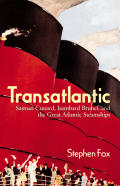 Larson: We're in a very different period altogether. It's more colored by cynicism, scaled-back ambitions. Look at how widely divided the politicians are with regard to NASA. Even when I was growing up in the '60s, everybody was behind the trip to the moon.
Larson: We're in a very different period altogether. It's more colored by cynicism, scaled-back ambitions. Look at how widely divided the politicians are with regard to NASA. Even when I was growing up in the '60s, everybody was behind the trip to the moon.
It was like, Oh, man. This is so cool. Frankly, what's missing is a sense of what's cool. [Laughter]
Rhianna: It seems like part of what draws you to the early 20th century is that sense of ambient hubris, but also Americans' former wonder and naiveté.
Larson: Yes, very much so. That's what was very prevalent. The nice thing, from a writer's perspective, is that when you do have an awful lot of hubris, and you are naive, and you are imbued with a sense of wonder, sometimes some bad things happen. [Laughter]
In the case of Isaac's Storm, there's the weatherman who thought he knew every damn thing about the weather, and guess what? He was wrong. In the case of the Lusitania, here was this belief that the ship was too big and too fast to be torpedoed, and also that the war was still too civil to even entertain the idea that somebody would try to sink a fully loaded passenger ship. Even Churchill, that energetic, reckless genius, couldn't imagine that happening, though Jacky Fisher, his colleague in the admiralty, had a very clear sense of what the possibilities were.
Rhianna: One interpretation of the evidence you lay out in Dead Wake is that Churchill and the British Admiralty were actually complicit in the sinking of the Lusitania.
Larson: That's what's often said about Churchill. I lay out the evidence, and I lay out the question that was on everybody's mind at the time. I can't prove that the Admiralty had any complicity. There's no smoking memo. But when you take all of the evidence and you try to say, "Okay, there was no intent," you know what? It's hard to prove that.
Can I ask you a question? Before you read this book, if somebody had asked you how soon after the Lusitania sank did we enter WWI, what would you have thought?
Rhianna: I would have thought immediately. I didn't realize it was two years later.
Larson: I know. That's the strangest thing about the whole process of this book for me. The myth that is commonly held throughout America today, at least prior to this book, is that Lusitania sank and, boom, we're in the war. It was like World War I's version of Pearl Harbor.
In the course of my research, I asked people, "Just out of curiosity, how long do you think it was before we got into the war?" I got estimates from two days to two months.
Here it was, two years later. And then when Wilson does declare war, he doesn't even mention the Lusitania. By then so many other things had happened, it was almost as though Lusitania wasn't a part of the equation. Now, it was in the water, of course, in the atmosphere, but I was surprised by that.
Rhianna: I was startled by how much information the British had on the mission and whereabouts of German U-Boat Commander Schwieger, before he torpedoed the Lusitania. It sounds like there were opportunities to divert the ship from his path, and yet nothing was done. It made me wonder: Who do you see as primarily responsible for the disaster?
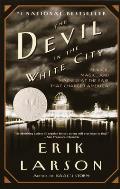 Larson: Here's the thing: Schwieger pressed the button. He killed those people. You could look at him as a soldier or as a murderer or as a war criminal, but there is nobody else to blame except Schwieger.
Larson: Here's the thing: Schwieger pressed the button. He killed those people. You could look at him as a soldier or as a murderer or as a war criminal, but there is nobody else to blame except Schwieger.
Having said that, you have all these other things that fall into the category of what I like to think of as "forces." Forces that gather to create a particular moment in time.
In this case, there is the Admiralty, the fog, the delays in New York. Even the delay for Captain Turner's niece could conceivably have meant the difference between life and death for Lusitania. There were so many forces that coalesced.
Rhianna: I really enjoy the complexity that all of those gathering forces bring to your books. It's better than a black-and-white narrative. History isn't like that.
Larson: No, history is nuanced. Frankly, there are no heroes.
Rhianna: A common structural thread in your books is the use of parallel narratives to provide different perspectives on the same or contemporaneous events. What do you like about this narrative structure?
Larson: I'm often associated with parallel narratives or dual narratives. The Devil in the White City was a fluke. I discovered the killer and then I came across the World's Fair. It was this juxtaposition of the two in the same place at the same time that made me think, Wow, this is amazing. I had the title, The Devil in the White City, and that's what that was about.
At the time, mind you, I was certain that that narrative structure was going to be the end of my career. It was violating every rule of narrative structure because there was no touching between the dual narratives.
Anyway, that was a dual narrative for a very specific reason. Then I did a book called Thunderstruck, which is about Marconi and the killer Crippen. I was afraid that everybody would think, Oh god, he's just trying to be derivative of his own structure. That, too, was a fluke. I thought to myself, Oh shit, I'm going to be doing another dual narrative, but there's no other way to do it. In the case of Dead Wake, there are parallel stories because there's no other way to tell the story well.
Rhianna: It's a fun way to present history because it blends meticulous research with fascinating characters and a novelistic plotline. I read in a prior interview that you sometimes teach. Do you think there's a pedagogical benefit to writing this kind of narrative history?
Larson: I don't write it for that reason, believe me, but I do think there's a pedagogical benefit, especially in the case of the Lusitania. As we both realize, there is a real knowledge gap when it comes to the ship and what led America into World War I. I hate to say this, but a lot of this did come as a complete surprise to me. Here, for the first time for me, reading all this material, I suddenly had a much better understanding of how World War I actually came about, and of Wilson's reluctance. Everybody assumes there was this clamor for war. I loved it when I came across petitions from a medical student from Chicago and from the Tennessee legislature and so forth saying, "Look, the president has our absolute support, and let's not rush into anything."
This is going to sound strange I suppose, but my goal in writing history is not to inform in fact. However, if you want to use my stuff for a PhD, you're fine.
My goal is to produce as rich and historical an experience for the reader as I possibly can, to the point where when somebody finishes reading the book, he or she emerges from it with a sense of having lived in the past.
Rhianna: One of the richest, and least expected, aspects of Dead Wake is the love story of President Wilson and Edith Galt. Can you talk a little about how you use this storyline in Dead Wake?
Larson: I was going through Wilson's papers in the Library of Congress, and I came across these letters. There are a lot of them in there, and I started reading them. I had one impression of Woodrow Wilson before I started this book, and by the time I was done, I had a very different impression. These letters were so passionate, so naively, no-holds-barred romantic. First of all, I could not imagine anybody writing that letter today in the course of a courtship. Today it would be an email, "Hey, you want to hook up?" "Sure." [Laughter]
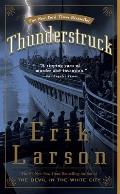 These things shed light on Wilson in a very powerful way. They shed light on the time, contouring this innocence. Also, America was not a war-thirsty country at the time. I felt the love story fleshed out the man who was going to be responsible for deciding what to do with the Lusitania after it happened.
These things shed light on Wilson in a very powerful way. They shed light on the time, contouring this innocence. Also, America was not a war-thirsty country at the time. I felt the love story fleshed out the man who was going to be responsible for deciding what to do with the Lusitania after it happened.
Rhianna: Another character who intrigued me was the pioneering bookseller Charles Lauriat Junior, who lost original manuscripts by Dickens and Thackeray in the sinking. Why did you choose him to help you tell the story of the Lusitania?
Larson: I chose Lauriat because of the immense detail that he stuck into his filings with the Mixed Claims Commission, which gave me a better sense than any of the other accounts of how people got ready for voyages, what they did the night before, what they did aboard ship. He was going through it like an affidavit for an investigation, because he wanted to make his claim to the Mixed Claims Commission. My sense is he wanted to snow them with detail.
Rhianna: Dead Wake ends with the ghost of Edwin Friend, a passenger who died during the sinking and then reconnected with friends and acquaintances via séance. This conclusion surprised me because it feels like a hopeful or even cheeky way to end the narrative. Why did you choose this ending?
Larson: I loved the idea that here they were: these were Spiritualists and they were going off on this ship and poor Edwin dies. They're all so focused on the afterlife. No doubt they made themselves believe that they actually had communications with this guy afterwards. I found it charming.
Rhianna: It's incredibly charming. It's also refreshing because there's so much grisly detail of the disaster toward the end of the book. It's gripping and very sad and then there's a slightly hopeful end to it. I was thrilled that Edwin's friend, Theodate Pope, survived the wreck.
Larson: I loved her. She allowed me to take a walk through this era, right down to the cure that she took. That was also the cure that's in the famous, pivotal short story "The Yellow Wallpaper." Here she was, undergoing the same thing. As I note in the footnotes, so did Wilson at one point. I'm glad I didn't have to kill her.
Rhianna: I was so relieved. It's funny. I knew the sinking was going to happen, obviously, but Dead Wake is suspenseful enough that I was like, Maybe it won't sink...
Larson: I'm so glad you said that, because that was my goal from the get-go. I hope that when readers read this book, as they're reading it, they will find themselves hoping that the ship does not sink.
What drove me to do Dead Wake was that after doing the most preliminary of reading and scoping out what kinds of materials might be available in archives and so forth, I realized that this book — the research, the writing — would present me with a rare opportunity to explore to a full extent the potential for suspense in a nonfiction work. I was trying to get into a Hitchcockian mode, but all real.
When you've got telegrams warning people of things, when you've got the submarine commander's log book, and all this other stuff, there is so much great material. The journey to find it, going to London, Liverpool, Cambridge, DC, the Archives, and so forth was such a pleasure for me. It's like a daily detective story. I love it. I couldn't not do the book.
Rhianna: Your love of research comes through.
To close, we like to ask authors what they're reading.
Larson: What am I reading? I just finished Station Eleven, which I loved. I'm still thinking to myself, How did that woman come up with that narrative and some of the elements of it? I started Kate Atkinson's Life after Life, and for various other reasons, I'm rereading, for probably the 12th time, The Maltese Falcon. There you go.